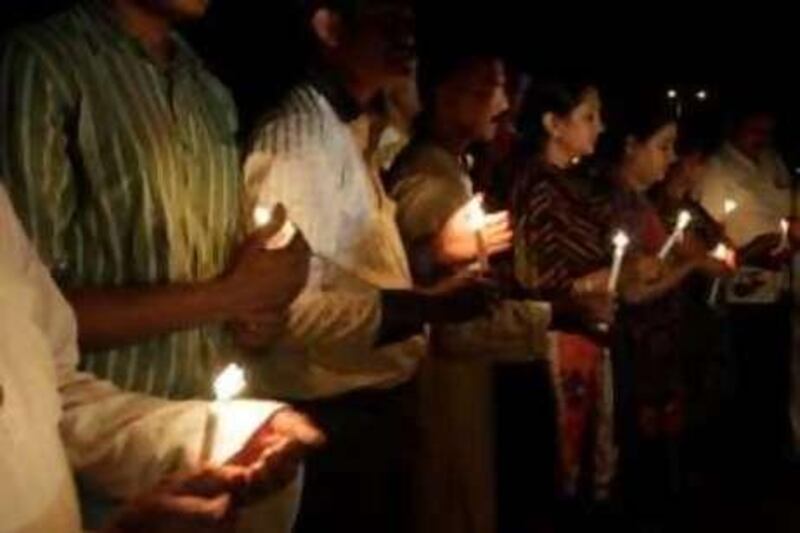NEW DELHI // Outraged by eight murders from within their ranks over the past seven months, anti-corruption campaigners in India are demanding the enactment of a whistle-blower protection law - similar to hate-crimes legislation in the US and other countries - specifically for right-to-information (RTI) activists.
However, the Indian federal ministry, which deals with public grievances, said last week the government had no plans to frame a law to protect exclusively the RTI activists, but that the draft of a general bill to protect those who "make public-interest disclosures" was nearing finalisation. The ministry, which deals with public grievances, said the new Public Interest Disclosure Bill, which is expected to be passed by the parliament this year, would empower the federal Central Vigilance Commission (CVC) to act as a pressure group on state police forces to provide safety to the whistle-blowers, including the RTI activists.
Prithviraj Chavan, the federal minister of state for public grievances, told members of the parliament the government was aware of the violence being perpetrated against the RTI activists and other whistle-blowers and that the new bill would be enough to deal with the violence against all of them. According to a CVC official, who spoke on condition of anonymity because he is not allowed to speak to the media, the bill would empower the CVC to act as a civil court with authority to direct state police agencies regarding the safety of whistle-blowers.
"CVC will have powers to monitor police actions in all cases involving the safety of the activists. It can summon anybody, order police investigations and can take action against police if [they fail] to provide safety to the whistle-blowers," he said. Biswajit Panda, an anti-corruption activist who participated in the July 26 demonstrations in New Delhi over the July 20 murder in Ahmedabad of Amit Jethwa, who had been fighting against the illegal mining mafia in Gujarat, said:
"The government must take a proactive role to immediately enact the law to protect the country's thousands of RTI activists who are fighting against corrupt networks, fatally risking their lives." Until 2005 the disclosure of public records was banned in India under the 1889 Official Secrets Act, dating back to British rule. After the RTI Act became law, granting citizens the right of access to any official record of the state or federal governments, activists began using it as an effective tool to expose corruption.
Between 2006 and 2009, more than three million RTI applications were filed to government departments across the country. Transparency watchdogs said there has been a considerable decline in corruption during that time. But the process of achieving this success has found RTI activists paying a heavy price. Along with the eight murders, 20 other activists have been violently attacked this year. "The murder of the RTI activist ironically highlights the continuing success of the RTI Act against corruption," said Amar Singh Rathor, a Gujarat-based RTI activist. "Jethwa challenged the mafia and they got frightened of being exposed because of his action."
Relatives of Jethwa alleged that the BJP Parliamentarian Dinubhai Solanki was the force behind his death. "Mr Solanki and his relatives have been running the illegal quarries and crushers on government-owned land at the edge of Gir lion sanctuary [in Gujarat], a protected forest area. Amit filed at least a dozen RTI petitions seeking to know how the private quarries and crushers could run on government land," Bhikhubhai Jethwa, Amit Jethwa's father, claimed on television.
"Unknown callers asked Amit many times to stop challenging the operation of the illegal quarries and crushers run by Dinubhai Solanki and his relatives and gave him death threats. He [Mr Solanki] also threatened Amit directly in front of huge crowd of his supporters ... I am convinced Mr Solanki and his relatives have got my son killed." Mr Jethwa offered no proof of his claims. Mr Solanki went underground a day after the killing, according to TV reports. Mr Jethwa has lodged a complaint with local police pointing a finger towards Mr Solanki and his relatives.
Using RTI applications over the past year, Amit Jethwa gathered information showing that the quarries and the crushers were illegal and damaging to the environment, according to the RTI activist Amar Singh Rathor. Two months ago, along with the materials he had gathered using the RTI Act, Amit Jethwa moved a Public Interest Litigation in the Gujarat High Court seeking action against the illegal quarries and crushers.
"Parts of the government machinery which have turned corrupt and are threatened to be exposed by RTI activists are hand in glove with the mafia and they are taking such horrendous steps to still voices of protests of the activists," said the veteran RTI activist Aruna Roy, a former civil servant who is based in Rajasthan. "Unless the government comes clear or takes a strong position against these perpetrators, vulnerable activists will continue to be targeted ... We urgently need a whistle-blower protection act. It is an appalling feature of a society that activists working to expose the corruptions in the system are not protected under the law."
The RTI activist Nikhil Dey, who has offered to take up the cause of illegal quarries and stone crushers raised by Amit Jethwa, said he and his fellow activists would not be frightened by the killings of other activists. "Their attempt to silence the activists will only make our protests grow louder," Mr Dey said. @Email:foreign.desk@thenational.ae This article has been altered. In the original version it stated that Ahmedabad of Amit Jethwa had been killed on July 21 when he was actually killed on July 20.





